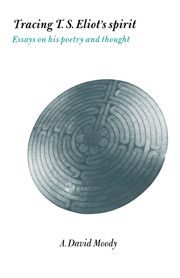10 - Being in fear of women
Published online by Cambridge University Press: 05 November 2011
Summary
In his 1933 lectures on the use of poetry Eliot tied together, in a strikingly suggestive fashion, poetry, fear and being. Poetry, he said, ‘may make us from time to time a little more aware of the deeper, unnamed feelings which form the substratum of our being’. We may gather from an earlier statement in the same lecture that what for him most characterised the substratum of our being was ‘the burden of anxiety and fear which presses upon our daily life so steadily that we are unaware of it’. It is indeed the case that fear, in one form and another, is the predominant emotion in Eliot's poems and plays and the motive force of his spiritual quest. But is it the case that his poetry in disclosing that burden and motive discloses also the common ground of our being?
Some support for an affirmative answer to the question can be drawn from Heidegger's early ontology. Heidegger too maintained that our deepest moods disclose to us something essential about the nature of man's existence; and that it is above all the state of anxiety which does this. For in reflecting upon the anxiety endemic in our existence we may be brought to realise our nothingness, that is, the non-necessity of our existence. And this, Heidegger suggested, might be our nearest approach to a knowledge of Being.
- Type
- Chapter
- Information
- Tracing T. S. Eliot's SpiritEssays on his Poetry and Thought, pp. 182 - 195Publisher: Cambridge University PressPrint publication year: 1996

